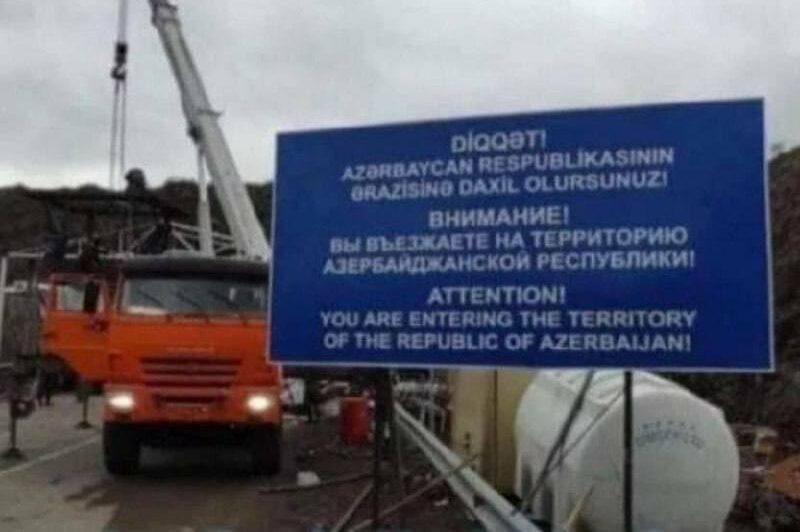It means that personnel, weapons, and military equipment will no longer be transported from Armenia to Karabakh. Armenian officials, administrators, and political provocateurs will no longer travel there either. Just as importantly, the overseas curators of the Armenian project, be they the pompous Baroness or the slim “Frenchman from Bordeaux”, will no longer enter our territory.
Life in the Armenian community will dull before boiling over after joining the Azerbaijani economy, opponents of integration will drive their cars and will make a long procession to Armenia where they will certainly be “very welcomed”. The sad-eyed oligarch will start resembling a character from a famous movie, stuck at the airport for the rest of his life. He will stand at the main crossroads all day and night, mad and gaunt, annoyingly offering to help mothers with children cross the road, and they will avoid him like a leper. Such is the sad finale of “miatsum”…
The installation of the checkpoint also means that the remnants of the Armenian band formations have found themselves in a trap, and now they have only two options – either to wait for special operations to liquidate them, or to surrender to the Azerbaijani authorities. But since no one wants to be captured or die they are likely to follow the third option – throw off their ammunition and make an attempt to get to Gorus under the guise of civilians. Futile hopes. All the bandits will be detained at the checkpoint.
All great deeds are done routinely. That is how, while we were engaged in our weekend walks and shopping, our border guards erected a checkpoint in the Lachin district, drawing a line under the “glorious and long-suffering” history of “miatsum”.
But the mundane event was preceded by long and painstaking work. Moreover, the mundane nature of the final act itself is proof of the tremendous preliminary preparation for it. Here we want to digress and again address the so-called “dissatisfied”. Let us remind them once again that in politics the justice of an action doesn’t mean that it is expedient for a certain period of time. And not only in politics. All those who rattle off angry statuses and comments on social networks about the inaction or tardiness of the Azerbaijani leadership to adequately respond to Armenia are unlikely to be able to achieve their just desires so easily even in everyday life.
Those who often postpone decisions in their everyday life, boldly raising complaints against the country’s leadership – “why don’t we put up a checkpoint?”, “it was high time” and so on.
If it had been possible, the checkpoints would have been set up as early as 2020. However, it was still too early at the time. The checkpoint establishment was hampered, among other things, by pressure from the world powers. The same ones who put sticks in the wheels of our state machine which was grinding Armenian fascism in the autumn of 2020. It is probably worth recalling arms deliveries and attempts to persuade the UN Security Council to adopt anti-Azerbaijani resolutions. To understand the full extent of the external pressure, we suggest recalling the words of President Ilham Aliyev about an event that is not formally part of the Armenian-Azerbaijani conflict, namely the Baku-Tbilisi-Ceyhan pipeline project, which was adopted a couple of decades before the Patriotic War. “But I remember when we were determining the route of the Baku-Tbilisi-Ceyhan pipeline, I was working for the State Oil Company at the time, and there was enormous pressure on us, and from Western countries. Why does it bypass Armenia? It must go through Armenia, not Georgia,” Ilham Aliyev said in a video address to the nation on December 1, 2020.
Even then, twenty years before the Second Karabakh War, the power players were trying to save Armenia from isolation and future defeat. Let alone the hot phase of the conflict. The Azerbaijani leader also mentioned in his speeches the pressure put on him during this historic period of 44 days. The world powers failed to stop our country. They failed not because they were weak, but because we were strong. And we were strong not only because we had a powerful, well-trained army. We were just as strong because of our timing. Timing is one of the basic elements of strategic planning. Technically, the defeat of the Armenian forces was possible back in 2016, if not earlier. However, Azerbaijan did not develop a counter-offensive at that time, limiting itself to reconnaissance combat. It would not be wrong to say that such reconnaissance probed not only the actions of the Armenian defence, but also the reaction of world forces.
Everything in the Azerbaijani leadership’s policy is subject to strategic planning. This does not mean that all plans are carried out strictly on specific dates. No, we do not live in a vacuum, and the dates themselves are adjusted according to the emerging situation. Analyzing circumstances beyond our control and turning them to our advantage are key components of the Azerbaijani leadership’s policy. Moreover, events may be either distant or approximate in relation to the anticipated time of implementation of an action.
And coming back to the powers: it is clear to everyone that they would not want Azerbaijan to have full control over the Lachin-Khankendi road. The reason is simple: to keep tensions so that it is easier to impose their will on the parties. And here, in addition to the determination to take this step, it was very important to prepare the international community for it. This was done with precision. President Ilham Aliyev first officially proposed the opening of a checkpoint on the Armenian-Azerbaijani border in February this year during a trilateral meeting with US Secretary of State Anthony Blinken at the Munich Security Conference.
The Armenian side, however, disavowed this intention in every possible way. On the other hand, with its provocations against the Azerbaijani Armed Forces, both on the border and on the territory of the temporary control of the RPC, Yerevan only aggravated the reason and accelerated the moment of the checkpoint’s establishment. Demand for the checkpoint increased from Azerbaijani society, which was echoed by the media. Two months after the first official mention of the need for a checkpoint by President Aliyev, the world was thus ready for such a step.
From the point of view of international law, there is nothing to be complained about. However, we know that strong powers use the law as they think fit. Consequently, it was very important to guess the time when the potential risks were minimised. And the right moment came on April 23.
Such factors as the solid state and army of Azerbaijan, full compliance with international law, strategic alliance with Türkiye, the significance of our country as a supplier and, what is equally important, a transit country of energy resources to Europe, the need to counter Iranian influence in Armenia do not allow the Western powers to prevent the installation of the checkpoint.
On April 23, Vedant Patel, deputy speaker of the US Department of State expressed his concern about the checkpoint. It is not the first time we have experienced the “concern” of world powers. Today, Armenian journalists swooped on the US Ambassador in Yerevan asking her whether she considered Azerbaijan’s actions to be “genocide” and whether the US would apply sanctions to Baku, to which the ambassador, barely hiding her irritation, actually said “no” twice.
Engaging with Russia, the West’s antagonist, was no less difficult. Here, Azerbaijan’s alliance treaty with Russia, its non-adherence to anti-Russian sanctions, on the other hand, Moscow’s lower attention to the South Caucasus due to the Ukrainian conflict contributed to a situation in which Russia was also unable to oppose the establishment of the checkpoint in Lachin. Tellingly, the pro-Kremlin Telegram channels fully endorsed the establishment of this checkpoint by Azerbaijan, justifying this step, incidentally, by the consideration of protecting Russian interests from Armenian provocations initiated to set the region on fire and open a second front against Moscow.
All this is the result of strategic actions. In addition, President Aliyev proved once again that he never makes unsubstantiated statements. It should be noted that he did not even promise, but only offered to set up a checkpoint…
As we know, the awareness of unpleasant but inevitable facts includes five stages – denial, anger, bargaining, depression, and, finally, acceptance. The world powers seem to have gone through this cycle. For Armenians, who, with their inherent stubbornness, realise too late, it is only just beginning. Their military defeat in the 44-day war has not inspired them to realise their political defeat. There is a small hope that the border checkpoint will bring sense to revanchists in Armenian society. It is high time for Armenia to deal with internal problems on the notorious 29,8 thousand square kilometres (adjusted for the Azerbaijani enclaves). We have repeatedly said that Armenia has never been a subject of international politics, and in the modern part of history is already losing formal signs of sovereignty. Like Shakespeare’s Polonius – “not where he eats, but where he is eaten”. To stop being a “supper”, Armenia will have to do the nearly impossible – to reformat the current national idea of ethnic exclusivity with corresponding claims to its neighbours. Prime Minister Pashinyan, for all his hysterical and ambiguous behaviour, is sometimes doing a useful job of voicing ideas to revise the notion of patriotism in the Armenian way. How successful it is will depend on a number of factors. We will, of course, wait with cautious hope for positive changes on the other side of the checkpoint.
In the meantime, it is good that this checkpoint exists.
Murad Abiyev
Caliber.Az










